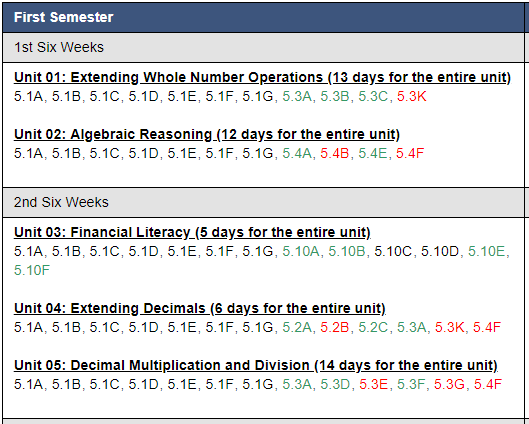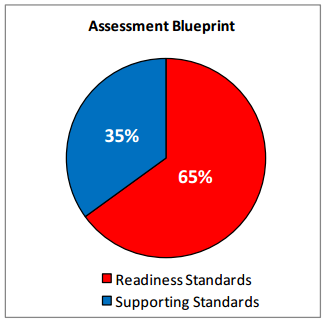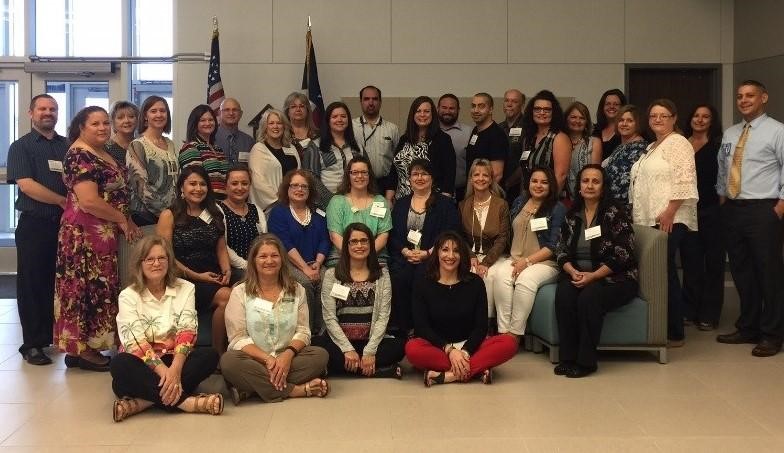 |
|
|
|
Twitter
ELA/R Twitter
Science Twitter
Social Studies Twitter
Bilingual Twitter
|
|
|
 |
|
|
A Note from the TEKS Resource System Director, Ann Graves
|
|
I hope this newsletter finds each of you relaxing and reflecting on a job well done! Thank you for selecting a profession that influences so many students. We appreciate you!
If you have not registered for the TEKS Resource System Summer Conference (TEKSCON), please do so now! There will be multiple opportunities for excellent professional development for both K-12 teachers and administrators. Come if you are a teacher, a principal, a superintendent or if you want to start the new school year with fresh ideas and strategies. There will be opportunities to build your network with peers, and of course, enjoy beautiful San Antonio! July 31-August 2 are the dates, and hotel rooms are still available. Please go to tcmpc.org/conference and find all the information you need for registration. The conference schedule will be available soon.
One new event the TEKSCON will highlight is a Showcase featuring many free resources for all educators. Time is a challenge for teachers, so you will want to take an opportunity to explore the Showcase with your content area in mind. Visit with the Witte Museum, The Institute of Texan Cultures, the Bob Bullock Texas State History Museum, the Texas Alliance for Geographic Education and many, many more. The Showcase will take place Wednesday, August 1st right after lunch. Do not miss this new event!
Again, please enjoy your short summer months. Those of us with the TEKS Resource System will see you in San Antonio!
Sincerely,
Ann Graves
Director, TEKS Resource System
|
|
|
NEW Performance Tasks in 6th, 7th and 8th Grade Social Studies
|
|
|
In addition to Unit Assessment Items and Performance Assessments, social studies now has Unit Performance Tasks in 6th, 7th, and 8th grade. You can access these tasks in the IFD below the Performance Assessments. See below for a description of performance tasks and access the document
Unit Performance Tasks Best Practices in the Resource Section of 6th, 7th, or 8th grade social studies.
What is a Unit Performance Task?
Unit Performance Tasks are assessments designed to provide students with an opportunity to demonstrate transference of learning and synthesis of understanding by producing an authentic product. The unit performance tasks measure complex processes as opposed to discrete content that can be assessed using multiple choice items provided in the TEKS Resource System Assessment Creator. Optimally a unit performance task would address "What do people do with this knowledge outside of
school?"
Why should teachers use Unit Performance Tasks?
Assessing student mastery of unit content and skills requires a variety of assessments serving as multiple sources of evidence. The unit performance tasks were specifically designed to measure transference of the content and mastery of skills. In other words could a student use the knowledge and skills gained in the unit instruction to produce a unique original product?
|
|
|
NEW K-5 Science Formative Spiral Items!
|
|
|
In addition to Unit Assessment Items and Performance Assessments, science now has Formative Spiral Items available for K-5. These items can be used to scaffold, review, or check for understanding within and across grade levels. Items for 6-12 are under development.
You can access formative spiral items by using the Assessment Creator in the online system. If you need support using the Assessment Creator you can find both a video and instructions in the HELP section of the website by clicking the HELP icon in the top right corner of the screen OR by clicking the SUPPORT icon at the bottom of the screen.
|
|
|
Resources and Supplies for the Mathematics and Science Classrooms
|
|
|
The content areas of math and science have each recently published a document to help districts and campuses make decisions about possible math manipulatives and science equipment to purchase for the classroom. Many of the districts affected by Hurricane Harvey were needing to purchase new supplies and these documents were created to help support this effort. Both documents can be found in the Resource Section of the respective content.
|
|
| Mathematics Suggested Basic Manipulatives by Grade Level |
|
|
| Vertical Alignment of Science Equipment |
|
|
|
NEW STAAR Science Blueprints are Posted!
|
|
The new science STAAR Blueprints are posted on TEA's website. Follow this
LINK to access the new documents.
For more details, read the science update in the content update section of this newsletter.
|
|
|
| ELAR and SLAR Content Development Team |
Did you know that educators across the state are contributing to the creation of the
NEW ELAR/SLAR documents that will be available for K-8 implementation in 2019-2020 and for high school implementation in 2020-2021? There are 28 contractors, both writers and reviewers, currently working to create and review the curriculum and assessment components. Fifteen of the Education Service Centers will be hosting Focus Groups made up of teachers who will review the documents and give feedback. In addition, there are over 40 Education Service Center ELAR/SLAR specialists who helped review and discuss specificity at our April ESC Conference. YOU can review documents and give feedback through the online system as well. The documents will show up in the resources section of each grade level in the online system. It takes all of us working together to create the high-quality documents that will support planning and instruction for ELAR/SLAR teachers across the state!
A huge shout out to our ELAR/SLAR Content Development Team and all the educators who are contributing to the development of the new curriculum and assessment documents! Thank you for the work you do for Texas teachers and students!
|
|
|
New and Improved Year at a Glance
|
|

Notice the 5th grade math Year at a Glance above. The readiness and supporting standards have been color coded to emphasize their importance. All assessed grade level YAGs have been updated like the YAG above.
Readiness Standards are color coded
RED
and
Supporting Standards are color coded
GREEN. The standards at the beginning of each math unit above are process standards (5.1A - 5.1G). If a standard is not red or green then it is either a process standard or a non-assessed standard.
So what is the significance of the two different types of content standards you wonder?
Well,
readiness standards are defined by TEA as having the following characteristics...
- They are essential for success in the current grade or course.
- They are important for preparedness for the next grade or course.
- They support college and career readiness.
- They necessitate in-depth instruction.
- They address broad and deep ideas.
Supporting standards are defined by TEA as have the following characteristics...
- Although introduced in the current grade or course, they may be emphasized in a subsequent year.
- Although reinforced in the current grade or course, they may be emphasized in a previous year.
- They play a role in preparing students for the next grade but not a central role.
- They address more narrowly defined ideas.
The two graphs below are important in demonstrating the portion of the grade level TEKS eligible to be assessed that
readiness
and
supporting
standards make up and the portion of the grade level STAAR/EOC assessment that readiness
and
supporting
standards make up.
The graph above shows the percent of TEKS eligible to be assessed that are Readiness (30%)
and
Supporting (70%)
. This shows that there are many more supporting standards than readiness standards.

This graph shows that the assessment is made up of greater percent of items aligned to
readiness standards (65%)
as aligned to
supporting standards (35%)
.
It's critical that we go deep with our
readiness standards to insure that our students are "ready" for the next grade or course, for college and career, and for the STAAR assessment. The
readiness standards
are POWER standards for our students! In addition, we must teach supporting standards to make sure we don't create gaps for students that other teachers will need to fill. By law we teach them all.
The information about readiness and supporting standards above comes from the document
A New Assessment Model that can be found on the
STAAR Resources website. This document was published in October 2010.
|
|
|
2018 State TEKS Resource System Conference:
TEKSCON
|
|
We are hosting our annual
2018 TEKS Resource System Conference in San Antonio on July 31 - August 2. We have an amazing lineup of presenters and inspirational speakers to motivate and inform you and your team for the 2018-2019 school year.
___________________________________
2018 State Conference Keynote
Don't miss this inspiring message from
Kim Thomas!
Be a trend setter, and create your own history! Live your priceless calling as an educator. Learn techniques to ensure the fun in your classroom is contagiou
 s. Everyone loses track of time when they are laughing. Kids are less likely to misbehave when they enjoy learning.
s. Everyone loses track of time when they are laughing. Kids are less likely to misbehave when they enjoy learning.
Light up your passions
Overpower each student with the belief they need
Verify you trust and students will trust you
Embrace differences and celebrate similarities
Your students will learn at a depth they never thought possible.
AND submit a speaker proposal! Registration is free for the lead speaker on each proposal.
Click the image or link below for a Video from the
|
- THE NEW ELAR/SLAR Curriculum is BEING RELEASED!!! Look for these documents in the Resource Section at www.teksresourcesystem.net.
- June 2018 - K-12 Vertical Alignment Documents (VADs) and TEKS Clarification Documents (TCDs) with specificity
- July 2018 - K-8 1st semester Year-At-A-Glance (YAGs), TEKS Verification Documents (TVDs), and Instructional Focus Documents (IFDs)
- October 2018 - K-8 2nd semester Year-At-A-Glance (YAGs), TEKS Verification Documents (TVDs), and Instructional Focus Documents (IFDs)
- The development of high school IFDs has begun. The draft high school YAGs, TVDs, and IFDs are scheduled for release June 2019.
|
Completed Work

- Geometry Formative Spiral Items for Units 01 - 10 are complete and live in the Assessment Creator Item Bank. Unit 11 is a unit with a performance task and no new instruction. Therefore, there are no formative spiral items for Unit 11.
- NEW resource - Mathematics Suggested Basic Manipulatives by Grade Level is live in the Resources section of each IFD. Details about the resource have been added to the News & Updates section at the bottom of the home page.
- Current Assessment Item Bank Counts
- 3,498 Mathematics Unit Assessment Items, Grade 2 - HS
- 1,402 Matemáticas Unit Assessment Items, Grade 2 - Grade 5
- 1,674 Mathematics Formative Spiral Items, Kindergarten - Grade 8, Algebra I, Algebra II, Geometry
- 881 Matemáticas Formative Spiral Items, Kindergarten - Grade 5
Current and Future Work
- ETCD examples are being reviewed for clarity, uniformity, and consistency. Algebra I, Algebra II, and Geometry review is complete. Precalculus will be the next course to be reviewed. Then, the last course will be MMA.
- Statistical display standards in Grades K - 8 and MMA are being reviewed for clarity, uniformity, consistency, and vertical alignment. We are adding some additional specificity and a few new examples as needed.
- Overarching/Unit Understandings and Questions are being reviewed and revised based on current training with Jay McTighe. These revisions will begin to roll out Fall 2018.
- Assessment Item Bank gap analysis and new item writing will begin development in the near future.
- New Resources in development
- Concept Tree will be replaced with Concept Charts (K - 5, 6 - 8, HS; available Fall 2018)
- Backwards Design Documents (K - HS; available Fall 2018)
- Engaging Literature for the Mathematics Classroom (available Late Fall 2018)
TEKS Resource System Summer Conference in San Antonio
- Sessions are being organized for the TEKS Resource System Summer Conference July 31 - August 2, 2018. Mathematics sessions will include topics such as planning using the PA, IFD, ETCD, error analysis, and depth of knowledge; differentiating and using performance assessments; building comprehension and fluency in basic operations; building mathematics vocabulary; and fun interactive instructional strategies such as foldables, Lego sessions, music, cooking, etc. to deepen understanding and make math enjoyable. Hope to see you there. Come join the fun.

|
2018-2019 Science Content Development
- The New 2018-2019 Science TEKS are in the TEKS Resource System site and are clearly labeled "New 2018-2019". They are available to view under the standards tab.
- Streamlined Science TEKS Side by Sides can be found in the Resource section of each course or grade level.
- As of June 1st, 100% of K-8, Biology, IPC, Chemistry, and Physics YAGs, TVDs, VADs, TCDs, and IFDs have been published in the site. The titles of these documents begin with "2018-2019" to prevent confusion with the 2017-2018 documents. Due to summer school, these documents will live side by side in our site until mid-summer. If a document does not contain "2018-2019" in its title, it will not match the new documents and is considered a 2017-2018 document.
- All grade levels and courses have a short introductory unit to begin the school year to allow for the establishment of science procedures, including safety and notebooking. These units will not be assigned a number, and there will not be any assessment items associated with introduction units. Process skills should be taught throughout every unit in the context of the content.
- We have revised our concepts, overarching understandings and questions, as well as unit understandings and questions.
- Every grade level and course has a TCD.
- We have a NEW resource, Vertical Alignment of Science Equipment, which can be found in our Resource section.
- Streamlining of assessment begins in June. We had to wait for the 2017-2018 school year to end.
- Sample Guiding Questions will be streamlined over the summer.
- Development of new PA rubrics will begin late summer or early fall. We apologize for any inconvenience. We have to align the rubrics to new streamlined PAs, and make the format and language consistent for K-12.
- We are offering the following course versions for high school:
- Biology Systems Macro to Micro
- Biology Systems Micro to Macro
- Our current Biology Concept-Based is going away for 2018-2019. However, the units have been absorbed into the Biology Systems courses with a different sequence.
- Please see the Biology Concept-Based to Systems Crosswalk in the Resource section of Biology for details.
- Biology Sequential
- IPC Chemistry First
- IPC Physics First
- COMING SOON! We are working on several new resources including a backward design document and a vertical vocabulary list.
- NEW HS Science/CTE Course Development
- Anatomy and Physiology will be available in the site for the 2018-2019 school year.
- Forensic Science CTE is currently in development and will continue to be in "DRAFT" status in our Resource section until further notice.
- All new HS courses for science credit are searchable under High School Courses and Science, including CTE courses for science credit.
TEA and Science STAAR
- TEA has released the updated STAAR Blueprints. (5/22/18)
- The Readiness and Supporting Standard designations remained the same.
- Grade 5 STAAR - Readiness Standards went from 12 to 11
- Grade 5 STAAR - Supporting Standards went from 22 to 19
- Please note that the former Grade 5 (7D) from Reporting Category 3 is now the new Grade 5 (9D) in Reporting Category 4
- Grade 8 STAAR - Readiness Standards went from 15 to 14
- Grade 8 STAAR - Supporting Standards went from 34 to 29
- Biology STAAR - Readiness Standards stayed at 16
- Biology STAAR - Supporting Standards went from 26 to 19
- The number of Biology questions went from 54 to 50.
- The number of Readiness Standards assessed went from 32-35 to 30-32.
- The number of Supporting Standards assessed went from 19-22 to 18-20.
- Please note that Biology (9A) moved from Reporting Category 1 to Reporting Category 4.
|
|
The social studies team spent June publishing 18-19 updated curriculum components for each course. These updates include new course arrangements as well as new resources.
Important changes include:
- Thinking Like a Historian/Geographer units: Our team has reworked course designs in order to capture better the social studies process skills. Namely, we are highlighting the skills of the practitioner - such as how historians "do" the work of history; how geographers "do" the work of geography. You will find these skills units at the beginning of most courses. These units provide a springboard for the teacher to incorporate these skills into the pedagogy and instruction of each unit throughout the year. A "Thinking Like a Historian" (TLH) resource has been added to explain the units. Additional, the TLH resource provides an articulated, spiraled alignment of social studies process skills based on the TEKS.
- Performance Tasks: Middle schools course (grades 6, 7, and 8) now have a new assessment resource in the form of Performance Tasks. There is one overarching task aligned to each unit. The tasks align to the philosophy of the TLH units in that students "do" the work of a historian/geographer. These tasks expand assessment options and can provide additional data for teachers to evaluate student progress. See the new resource Unit Performance Tasks Best Practices for more detail.
- Overarching Understandings/Questions: All overarching understandings and overarching questions have been revised in all units. The social studies team worked with Jay McTighe to craft succinct statements/questions that focus on key understandings that emerge from a social studies education. The Social Studies "Big Ideas" resource provides background information as well as the entire set of overarching understandings/questions. These 23 understandings and accompanying questions are embedded in all units K-12. They are repeated in order to demonstrate that there are similar, deeper understandings across a range of contexts.
- The Celebrate Freedom unit has been eliminated as a curricular unit and transferred to a resource guide. See the Guide to Celebrate Freedom Week resource for information on it and other mandated observances. It is local decision how to commemorate each observance.
- Using the Understandings-Based Curriculum of the TEKS Resource System in the Social Studies Classroom is a new resource that provides detailed explanations of each element and component of the social studies curriculum. Additionally, the resource provides the research that underpins the structure of the curriculum, the background and purpose of social studies education, and avenues for deepening scholarship.
- Social Studies Literacy Spiral Items: Grade 8, World History, and U.S. History have a new assessment option of social studies literacy spiral items available in the item bank. Each unit in the three courses has one item that assesses student literacy skills of analyzing a primary/secondary source and crafting an argument supported by evidence. These items are viewable in the item bank by choosing "formative spiral items" as an item type. See the resource Social Studies Literacy Spiral Assessment Items Info Sheet for more detail.
- Other new resources added this year include Using Political/Editorial Cartoons, Reading and Making a Map, Frequently Asked Questions (FAQ) in social studies, and a Document Analysis sheet.
|
|
|
 |